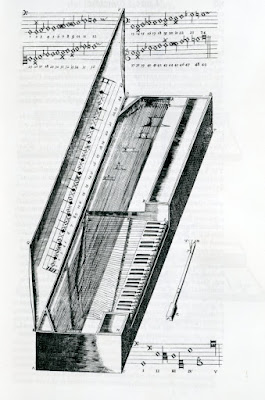[1] I couldn’t do this topic without hunting for the Latin for such a fabulous instrument. The Romans didn’t have it, but Bach did - and its name is listed in 1657:
Images #1 and #2: technica curiosa sive mirabilia artis (Gaspar Schott)
clavicymbalum, -ī [2/n]: harpsichord from Latin: clāvis (key) + cymbalum (cymbal)
Image #2: The history of this is interesting: a manuscript written by Arnault from 1440 has instructions for the manufacture of different keyboard instruments: "Four different mechanisms are described and pictured, including three that pluck the strings and one that strikes the strings. The striking mechanism, which Arnaut informs us could be installed in various forms of keyboard instruments regardless of their names ... indicates that the “piano” was not a later development but was contemporary with the harpsichord and clavichord. For some reason, it fell by the wayside only to appear sporadically until its final “invention” by Bartolomeo Cristofori around 1700." (Pollens, Cambridge 2022).
Bach: Harpsichord Concerto No.1 in D Minor BWV 1052 (Jean
Rondeau)
[2] Apart from the harpsichord another common keyboard instrument which preceded the piano:
clāvichordium, -ī [2/n]: clavichord
Image #3: drawing of a clavichord (1636)
[3] References to a piano date from 1700 as being owned by the Medicis; Cristofori, who is credited with inventing the piano, worked for them. The Italian term was clavicembalo col piano e forte, a key harpsichord with soft and loud i.e. a distinction was made since the instrument could allow variations in volume and tone depending on the force with which a key was struck. Therefore, the instrument was called a pianoforte and, in shortened form, piano. None of that, of course, is a Latin term!
One source lists seven Latin possibilities, some of which are more convincing than others. The one, however, which
appears in four references, three of which have citations, is:
clāvile, -is [3/n]: piano
- clāvilī canō: I play the piano
With references from at least the late 17th century:
clāviatūra, -ae [1/f]: keyboard








No comments:
Post a Comment